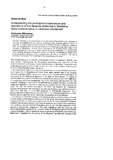Understanding the development experience and aspirations of one Basarwa settlement in Botswana: failed implementation or relentless colonialism?

View/
Date
2002Author
Nthomang, K.
Publisher
Pula: Botswana Journal of African Studies, www.thuto.org/pula/html/Type
Published ArticleMetadata
Show full item recordAbstract
This research note gives an overview of the doctoral research I conducted in 2000-0 I. The study entitled: Understanding the Development Experiences and Aspiration of One
Basarwa Settlement in Botswana: Failed Implementation or Relentless Colonialisms was
conducted among the Basarwa in the Kanaku settlement in the Southern Administrative
District of Botswana (Mabutsane-subdistrict). My motivation to conduct this study has stemmed from my own professional experience. As a lecturer in the Department of Social Work, and a member then of the Basarwa Research Committee (BRC) and a human rights activist, I became aware of the injustices
experienced by the Basarwa in Botswana in the name of "development". A number of concerns about the situation of the Basarwa, relating to the context, process and application
of development policies and programmes, were raised both locally and internationally with regularity. Engaging in these forums and participating in research activities, seminars and
conferences supported by the BRC changed me in a fundamental way. The experience has
taught me that the current environment in which the Basarwa are stigmatized,
disempowered and held with contempt by the dominant Tswana groups and the government
offers them little hope to realize their aspirations for development programmes. So, I
became interested in the processes that contribute to the continued marginalisation of the Basarwa and the search for answers, hence the conceptualization of this research.
The research examined the situation of indigenous peoples in a global context and linked it to the situation of the Basarwa in Botswana and the various development approaches and
strategies undertaken to address the situation. Specifically, the study explored how Basarwa resident in the Kanaku settlement understand development, as a result of their experiences with the Remote Area Development Programme (RADP), and what their aspirations are for
appropriate development programmes. The study highlighted both the immediate and underlying problems responsible for continued failure in the implementation of the RADP projects in Kanaku. Using a theoretical-historical perspective of multiple colonization as a
framework, I examined how the process of "development" has been and continues to be
168 used as a tool of colonization by dominant groups in society. I argue that the outcomes of
development have been detrimental to the lives of the Basarwa and have functioned
primarily as tools of colonization. The research calls for alternative development strategies to address the situation of the Basarwa in Botswana.
